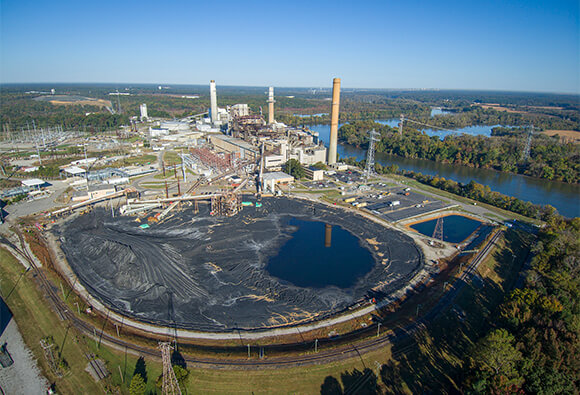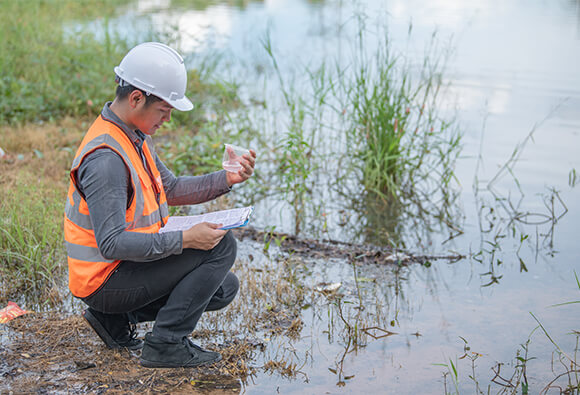How can we help you?


Protect the environment by meeting state and federal standards.
Ensure safety in our communities – we live here, too.
Communicate with our neighbors every step of the way.
As we shift to less carbon-based fuels for electric power generating, Dominion Energy has retired many of its baseload coal generating units.
Coal ash ponds and landfills have been used by industries for decades to store coal ash – a byproduct of producing electricity using coal powered boilers. In accordance with Federal Coal Combustion Residuals (CCR) regulations, Dominion Energy and all energy producers nationwide must operate and close coal ash ponds according to specific requirements. We are closing ash ponds in accordance with the Federal CCR rule and state regulations.
We are closing our coal ash ponds in accordance with all applicable federal, state, and local environmental regulations and necessary permits. We are committed to keeping our communities at the forefront of our plans and ensuring the water, air, and land are protected during the process. We have successfully and safely closed two ponds at our Bremo Power Station and two ponds at our Possum Point Power Station.
Existing groundwater and surface water monitoring remain in place and will be performed during and after closures are completed. Water stored in the ponds is treated before release and meets stringent permit limits. We currently have and are developing site specific plans for closing each of the ash ponds.

Before the coal ash ponds can be closed, the water stored in the ponds must be removed and treated in an onsite wastewater treatment system designed specifically to treat water from our ponds. This process is called “dewatering.” The ash must be dewatered to excavate, remove, and transport the ash for beneficial use or disposal. Dominion Energy is responsible for ensuring the treated water meets strict treatment levels required by our Virginia water permits prior to discharge.

Dominion Energy is responsible for monitoring groundwater quality in and around our ponds and landfills and understanding the data has our full attention. Groundwater monitoring and reporting will continue even after the ponds are closed.

Dominion Energy is committed to the health of our communities and our environment and will follow all state and federal guidelines for both the closure and monitoring of our coal ash ponds and landfills.
Regarding our coal ash ponds, all water will be treated to strict state permit limits prior to release, and we will continue to carefully monitor groundwater after the ponds are closed.
The closures need approval from multiple federal and state agencies and local jurisdictions regarding:

In Virginia, we are closing our ash ponds in accordance with the Federal CCR Rule, Virginia legislation, and the Virginia solid waste management regulations. Water stored in the ponds will be tested and treated before release, and existing groundwater and surface water sampling will remain in place at all stations where required. Any potential impact to the environment has our full attention. We are committed to keeping the environment in our communities clean, and our closure plans are implemented with a focus on public safety and protecting environmental resources. Groundwater monitoring will be performed during and after the closure of each pond. We have completed the closure of four of our ash ponds and are currently developing site-specific plans for closing the remaining ash ponds at our affected stations. We will also be developing transportation plans that will mitigate any impacts of truck traffic in the communities we serve in these locations.
We are committed to keeping the waterways in our communities clean. Treatment of water throughout closure is performed using an onsite multistage water treatment and filtration process designed specifically for each site's wastewaters. Treated water is thoroughly tested according to stringent, government-mandated standards prior to being discharged. The process incorporates state-of-the-art science and engineering and independent, third-party verification. Water is tested multiple times to verify compliance with strict permit limits before it is discharged, ensuring the safety of people, wildlife, and our environment.
We work with several top water treatment and engineering firms that specialize in on-site wastewater treatment design, engineering, construction, and operation. Each site has been evaluated individually to select the best treatment process to protect our rivers and other waterways.
In 2019, the Virginia General Assembly passed legislation requiring the removal of ash from existing ponds at certain Dominion Energy facilities to lined landfills or for a portion of the ash to be recycled. Dominion Energy supported this legislation. The legislation also requires submittal of biannual progress reports, beginning in 2022, to state legislative and executive branch officials.
As required by Virginia General Assembly 2020 legislation, Dominion Energy submitted a complete survey to the Virginia Department of Environmental Quality identifying all drinking water supply wells within 1.5 miles of our existing coal ash ponds at four facilities (Bremo, Chesapeake, Chesterfield, and Possum Point). In addition, Dominion completed testing of wells where authorized by the owners and submitted the results to the Virginia Department of Health and Virginia Department of Environmental Quality.
Bremo Power Station, located along the James River in Fluvanna County, was Virginia's oldest coal-fired power station. In June 2014, the facility converted remaining Units 3 and 4 from coal to natural gas and subsequently entered cold storage in 2018,closed in 2019, and was substantially demolished in 2022. Coal Combustion Residuals (CCR) from the former operation of Bremo's coal-fired boilers was managed and stored in three onsite ponds, the North Ash Pond, the East Ash Pond, and the West Ash Pond.
Dominion Energy has completed the removal of CCR from the East and West ponds and consolidated the ash into the North Pond under a Virginia Solid Waste Permit for Closure. Dominion Energy continues to comply with all operational requirements for the ponds in accordance with state and federal regulations and permits, including inspections, fugitive dust emission controls, and groundwater monitoring. Groundwater monitoring and reporting will continue after the ponds are closed.
Chesapeake Energy Center (CEC) is located adjacent to the Elizabeth River in Chesapeake, Virginia. CEC generated power from four coal-fired units and four gas turbines. The coal-fired boilers ceased operations on December 31, 2014, and have been decommissioned and the Station substantially demolished. Dry fly ash was stored in an onsite landfill permitted by Virginia DEQ since 1985. Adjacent to the landfill is the Bottom Ash Pond, which received wet sluiced bottom ash during the operation of CEC after 1985. CCR from the landfill, Bottom Ash Pond, and the former pond (Historical Pond) will be excavated and removed in accordance with the 2019 CCR legislation, federal and state CCR regulations, and state and local permits.
The Bottom Ash Pond and landfill continue to comply with all operational requirements in state and federal regulations and permits, including inspections, fugitive dust emission controls, and groundwater monitoring. The landfill, Bottom Ash Pond, and Historical Pond will be closed in accordance with all applicable federal, state, and local environmental regulations. Groundwater monitoring and reporting will continue even after these units are closed.
Chesterfield Power Station was once the largest coal fired power station in Virginia and is located about 15 miles south of Richmond on the James River in Chesterfield County. The station's last two remaining coal-fired units were retired in 2023. Coal Combustion Residuals (CCR) at the Chesterfield station were originally managed in the Lower and Upper Ponds, where CCR was wet sluiced from the station prior to settling out and managed in long term storage. Chesterfield Power Station switched from wet sluicing to a dry ash management system in 2017, and ash subsequently generated was managed in an onsite CCR landfill permitted by the Virginia DEQ.
In the interim, the Lower and Upper Ponds continue to comply with all operational requirements found in the state and federal regulations and permits, including inspections, fugitive dust emission controls, and groundwater monitoring. The Lower and Upper Ponds are both undergoing closure. Ash from the Lower Ash Pond is being transported to the Station's landfill for long-term storage. Ash from the Upper Ash Pond is primarily being transferred to an onsite load out building where it is loaded onto rail cars for offsite transport for beneficial use (recycling).
Clover Power Station is located along the Staunton River, in Halifax County, Virginia and has two coal-fired units.
Fly ash and bottom ash are collected in the facility's air pollution equipment and the boilers, respectively, and transferred in a dry state to the onsite lined Stage 3 landfill, a permitted industrial solid waste management facility under the Virginia Solid Waste Management regulations. The Stage 1 and 2 portions of the Clover solid waste management facility reached their maximum storage capacity in April 2003 and were subsequently closed in compliance with Virginia DEQ regulations.
Clover also has two sludge sedimentation basins used for settling wastewater solids, including FGD not captured in the station's filter press, prior to removal and disposal in the Stage 3 landfill. The sludge sedimentation basins were retrofitted with compliant liner in accordance with the CCR regulations in 2018-19.
Possum Point Power Station is located approximately 30 miles south of Washington, D.C. along the Potomac River in Prince William County, Virginia.
The station ceased burning coal in 2003. Coal Combustion Residuals (CCR) generated at Possum Point were historically managed in five ponds, A, B, C, D, and E. These ponds stopped receiving CCR after the conversion of Units 3 and 4 to natural gas in 2003. CCR has been removed from A, B, C and E ponds and consolidated in Pond D under a Virginia Solid Waste Permit for Closure. Pond D has a clay liner and a partial slurry containment wall. Pond D will be closed by removal of CCR under the 2019 legislation. A modern engineered landfill is planned to be constructed adjacent to Pond D. Once the landfill is constructed, ash from Pond D will be transferred to the landfill, which subsequently will be closed pursuant to a Virginia solid waste permit. Once Pond D closure is complete, the area will be graded for positive drainage.
Dominion Energy will continue to comply with all operational requirements for the ponds, found in the state and federal regulations and permits, including inspections, fugitive dust emission controls, and groundwater monitoring.
The Virginia City Hybrid Energy Center (VCHEC), located in St. Paul, Virginia, is a state-of-the-art coal-fired power station, and its circulating fluidized bed (CFB) unit uses coal, waste coal, and biomass for its fuel.
VCHEC's advanced CFB technology enables the use of run-of-mine coal, waste coal, and biomass, which are typically locally sourced. Use of waste coal, which often is stored along river and stream banks, is helping to reclaim these areas and reduce pollution in Virginia waterways. CFB technology combined with modern post-combustion controls produces low emissions of sulfur dioxide, nitrogen oxide, particulate matter and mercury.
Fly ash and bottom ash are collected from the power station and moved by truck to the onsite Curley Hollow Coal Combustion Residuals (CCR) landfill. The landfill is permitted by Virginia DEQ as an industrial solid waste management facility under the Virginia Solid Waste Management regulations and is considered a CCR landfill under the federal CCR Rule.
Yorktown Power Station is located in Yorktown, Virginia along the York River. Two former coal-fired units ceased operation in 2019, and the station's single oil-fired unit was retired in 2023. The Station is currently undergoing decommissioning and partial demolition. The adjacent Yorktown Power Station Landfill completed closure in September 2020, under federal and state regulatory requirements and is now considered by the Virginia Department of Environmental Quality to be in post-closure. Dominion Energy will continue to monitor groundwater and perform routine inspections to ensure security features remain in place and no damage has occurred to the closed facility.
In South Carolina Dominion Energy is closing our ash ponds by ash removal and landfilling. Work on these projects is nearing completion. To date, all ash ponds have been closed by removal except for two remaining ponds at the Canadys Station site. Planning and permitting for the closure of these two ponds is ongoing, with closure construction scheduled to begin within several years once all relevant permits are secured and plans completed. All remaining closures are on schedule to be completed before the December 2035 regulatory deadline.
Groundwater monitoring programs remain in place at all stations. Dominion Energy takes these results very seriously and any potential impact to our environment has our full attention. Groundwater monitoring and reporting will continue even after all ash ponds are closed. We are committed to keeping the environment in our communities clean, and ensuring our projects promote safety and environmental protection throughout this process.
Treatment of water during ash pond closure is performed using physical and chemical processes specifically designed for the pond's unique characteristics to meet stringent National Pollutant Discharge Elimination System permit limits prior to discharge. This process ensures treated water discharges remain protective of State water resources.
The 420-MW Cope Station is a coal and gas-fired generation facility located approximately 1.5 miles southwest of the town of Cope in Orangeburg County, South Carolina. Coal Combustion Residuals (CCR) material generated at Cope is placed in the onsite Industrial Solid Waste CCR Landfill. The onsite CCR landfill is permitted by the South Carolina Department of Environmental Services (SCDES) to receive and manage dry coal ash and dry Flue Gas Desulfurization (FGD) material. The onsite landfill meets the Federal CCR regulation requirements and will continue to operate in accordance with all applicable state and federal regulations and permits.
Dominion Energy South Carolina (DESC) owns and operates the 700-MW Wateree Generating Station, located along the Wateree River approximately 25 miles southeast of Columbia, South Carolina. The site included a 104-acre ash pond that contained coal combustion residuals (CCR), including sluiced fly ash and bottom ash. The pond was certified closed by removal and approved by the South Carolina Department of Environmental Services (SCDES) in November 2019. The closure project consisted of the excavation and landfill disposal of coal ash and impacted soil from the ash pond. The excavated material was placed in the onsite Industrial Solid Waste CCR Landfill. The onsite CCR landfill is permitted by the SCDES to receive and manage dry coal ash and flue gas desulfurization (FGD) material. The onsite landfill meets federal CCR regulation requirements and will continue to operate in accordance with all applicable state and federal regulations and permits.
Wateree also has two FGD sludge sedimentation basins used for settling wastewater solids prior to removal and disposal in the onsite landfill. The FGD material is generated as a byproduct from scrubbers or FGD used to clean air emissions under the station's air permit. The FGD material is primarily composed of calcium sulfate or gypsum. The sedimentation basins are considered coal CCR units and constructed in accordance with the federal CCR regulations. These two basins fully meet CCR regulation requirements and will continue to be operated in accordance with all state and federal applicable regulations and permits.
The 660-MW Williams Station is a coal and oil-fired power generating facility located in Berkeley County, South Carolina. The Williams Industrial Solid Waste Coal Combustion Residuals (CCR) Landfill is located offsite near station. CCR materials generated at Williams Station are placed in the offsite landfill. The landfill is permitted by the South Carolina Department of Environmental Services (SCDES) to receive and manage dry coal ash and flue gas desulfurization (FGD) material. The offsite landfill meets all CCR regulation requirements and will continue to operate in accordance with all applicable state and federal regulations and permits. The FGD material is generated as a byproduct from scrubbers or FGD used to clean air emissions under the station's air permit. The FGD material is primarily composed of calcium sulfate or gypsum.
Williams also has one FGD sludge sedimentation basin used for settling wastewater solids prior to removal and disposal in the offsite landfill. The sludge sedimentation basin is a CCR unit.
In West Virginia, we continue to operate our ash ponds in accordance with the Federal CCR rule. Groundwater sampling has been and remains in place at the station. We are committed to keeping the environment, including waterways, in our communities clean.
Mount Storm Power Station is located in northeastern West Virginia and has three coal-fired units. The Station also uses the latest technology to remove and capture fly ash and sulfur dioxide from the environment. The fly ash is handled dry in silos and transported by truck to the onsite Coal Combustion Residuals (CCR) landfill. Limestone scrubbers capture approximately 95 percent of the sulfur dioxide from the boilers and generate FGD sludge as a byproduct. The sludge is primarily composed of calcium sulfate or gypsum. The FGD sludge from Mount Storm is being used in the manufacturing of Portland cement when it meets end-user specifications. FGD sludge that cannot be beneficially reused is stored in the onsite FGD landfill. The Mount Storm CCR landfill is permitted under the West Virginia Department of Environmental Protection Solid Waste Management regulations and is operated in accordance with this permit as well as the CCR regulations, including inspections, fugitive dust emission controls, and groundwater monitoring.
Mt. Storm has three CCR ponds that are used as station low volume waste ponds and to settle CCR solids from the fly and bottom ash management areas. These three ponds fully meet CCR regulation requirements and are operated in accordance with all applicable regulations including inspections, fugitive dust emission controls and groundwater monitoring. Groundwater monitoring and reporting will continue even after the ponds and landfill are closed.